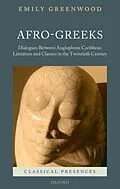Afro-Greeks examines the reception of Classics in the English-speaking Caribbean, from about 1920 to the beginning of the 21st century. Emily Greenwood focuses on the ways in which Greco-Roman antiquity has been put to creative use in Anglophone Caribbean literature, and relates this regional classical tradition to the educational context, specifically the way in which Classics was taught in the colonial school curriculum. Discussions of Caribbean literature tend to assume an antagonistic relationship between Classics, which is treated as a legacy of empire, and Caribbean literature. While acknowledging the importance of this imperial context, Greenwood argues that Caribbean appropriations of Classics played an important role in formulating original, anti-colonial and anti-imperial criticism in Anglophone Caribbean fiction. Afro-Greeks reveals how, in the twentieth century, two generations of Caribbean writers, including Kamau Brathwaite, Austin Clarke, John Figueroa, C. L. R. James, V. S. Naipaul, Derek Walcott and Eric Williams, created a distinctive, regional counter-tradition of reading Greco-Roman Classics.
Autorentext
Emily Greenwood is Associate Professor of Classics at Yale University.
Inhalt
- Introduction: Goodbye to Hellas
- 1: An Accidental Homer: Accidents of Homeric Reception in the Modern Caribbean
- 2: Classics as School of Empire
- 3: Translatio studii et imperii: The Manipulation of Latin in Modern Caribbean Literature
- 4: The Athens of the Caribbean: Trinidadian Models of Athenian Democracy
- 5: Caribbean Classics and the Postcolonial Canon
